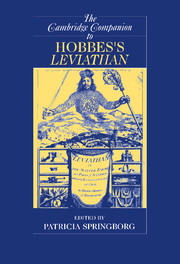Book contents
- Frontmatter
- General Introduction
- Part I: Of Man
- 1 Thomas Hobbes’s Visual Strategies
- 2 Leviathan, the Beast of Myth: Medusa, Dionysos, and the Riddle of Hobbes’s Sovereign Monster
- 3 Sense and Nonsense about Sense: Hobbes and the Aristotelians on Sense Perception and Imagination
- 4 Hobbes on the Natural Condition of Mankind
- 5 Hobbes’s Moral Philosophy
- Part II: Of Commonwealth
- Part III: Of a Christian Commonwealth
- Part IV: Of the Kingdom of Darkness
- Part V: Hobbes’s Reception
- Bibliography
- Index
- Series List
4 - Hobbes on the Natural Condition of Mankind
from Part I: - Of Man
Published online by Cambridge University Press: 28 November 2007
- Frontmatter
- General Introduction
- Part I: Of Man
- 1 Thomas Hobbes’s Visual Strategies
- 2 Leviathan, the Beast of Myth: Medusa, Dionysos, and the Riddle of Hobbes’s Sovereign Monster
- 3 Sense and Nonsense about Sense: Hobbes and the Aristotelians on Sense Perception and Imagination
- 4 Hobbes on the Natural Condition of Mankind
- 5 Hobbes’s Moral Philosophy
- Part II: Of Commonwealth
- Part III: Of a Christian Commonwealth
- Part IV: Of the Kingdom of Darkness
- Part V: Hobbes’s Reception
- Bibliography
- Index
- Series List
Summary
Political orders are kept secure not only by means of distance from what would destroy them, but sometimes by means of proximity thereto: for when the citizens are afraid, they hold firmly to the political order. Therefore those who think on behalf of the political order must contrive causes of fear, that the citizens may be on guard and like sentries at night not relax their watch; and they must make what is distant appear to be at hand.
Aristotle, Politics 1308a24–30It is natural to reflect on human nature and the nature of political society by speculating about how humans were or would be outside of such society. In writing the first part of his Leviathan, 'Of Man', and looking forward to the second, 'Of Commonwealth', Hobbes includes a chapter 'Of the Natural Condition of Mankind, As Concerning Their Felicity, and Misery'. He famously determines that in such a condition there is much misery, and precious little felicity. The first part of Leviathan is devoted to the question of human nature, and although there are scattered references to people's reactions to one another, it is not until chapter xiii that Hobbes systematically reflects on how the human beings he has been describing would interact. Although it is generally regarded as the starting point of his political theory, Hobbes places his account of the natural condition (along with his analyses of the law of nature and personation, both of which have some place in the natural condition) squarely in his theory of man. This is brought out by Hobbes’s reference in Leviathan to ‘the natural condition of mankind’ rather than ‘the state of nature’.
- Type
- Chapter
- Information
- The Cambridge Companion to Hobbes's Leviathan , pp. 109 - 127Publisher: Cambridge University PressPrint publication year: 2007
- 23
- Cited by

